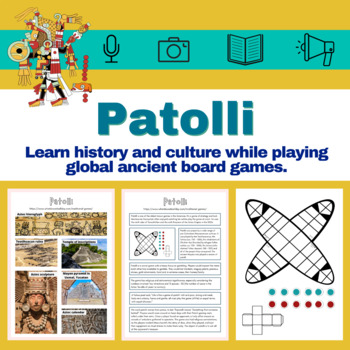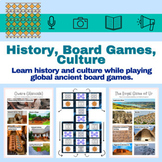Play Patolli Board Game: Learn About Mesoamerica and Board Games
What educators are saying
Also included in
- This is a fun resource to have on hand for lunch times, breaks, geography, social studies, and history classes! Students will be able to find instructions to make their own playing board, learn about ancient history and the history of various games, learn about different global regions of today, andPrice $7.00Original Price $9.00Save $2.00
Description
In this product, students will learn about a Mesoamerican board game called Patolli. Patolli was played by a wide range of pre-Columbian Mesoamerican cultures. It was played by the Teotihuacanos, the Toltecs (ca. 750 - 1000), the inhabitants of Chichen Itza (founded by refugee Toltec nobles, ca. 1100 - 1300), the Aztecs (who claimed Toltec descent, 1168 - 1521) and all of the people they conquered. The ancient Mayans also played a version of patolli.
Students will be able to find instructions to make their own Patolli playing board, learn about Mesoamerican history and the history of the game, and see a slideshow of Mesoamerican monuments as seen today. For further instructions on the rules of the game, players are encouraged to look online if they need to see videos of how to play.
This resource will be great for students who love games as it is an intense, social and fun game.
Patolli is one of the oldest known games in the Americas. It's a game of strategy and luck. Moctezuma Xocoyotzin often enjoyed watching his nobles play the game at court. He was the ninth ruler of Tenochtitlan and the sixth Emperor of the Aztec Empire in the 1500s. The word "Patolli" comes from "patoa" or "to bet". Tlapatolli means "Something that someone betted". Players would roam around on feast days with their Patolli gaming mats rolled under their arms. Once a player found an opponent, a lively affair ensued as crowds of onlookers gathered to spectate. The game also had religious connotations since players would invoke Macuilxochitl (the deity of dice) and kept their mats and playing pieces on shrines to make them lucky. The object of patolli is to win all of the opponent's treasure.
Studies have shown that learning about different cultures at an early age expands our horizons, allows us to be open to criticism, as well as to be patient and willing to consider other points of view. Learning about different cultures prepares students to become better citizens in their communities, to become more empathetic, to recognize their own strengths and points of view and makes them more open to new ideas. Furthermore, students will feel more confident and safe with differences later in life which allows them to interact in a wider range of social groups and feel more confident in their interactions with others. Another benefit is that students are better prepared for a diverse workplace which is crucial in our globalized world.
Terms of Use:
Thank you for your purchase! By purchasing this resource, you are agreeing that the contents are the property of Project Lead Learning and licensed to you only for classroom / personal use as a single user. I retain the copyright, and reserve all rights to this product.
♡ Let’s Connect ♡
Follow my store (click HERE to follow me) to receive news about product launches, freebies and discounts. Each resource that I post will be at a 50% off discount for the first 24 hours so if you follow my store you will be the first to know about new product discounts.
Don't forget to leave a review because every review you leave translates into TpT credits which you can gain to buy products. When you leave a review, you'll earn 1 credit for every $1 you spent on TpT for that resource. Each credit has a value of 5 cents, so every 20 credits earned equals $1 you can apply to future TpT purchases. For example, if you provide a review on a resource priced $4.75, you'll earn 5 credits.



